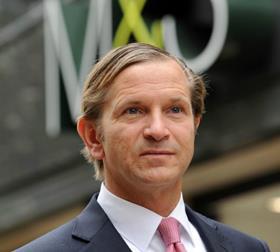
Marks & Spencer has announced a dip in pre-tax profits to£564.3 million, down from £658m last year, despite food sales rising 3.9 per cent for the year to 30 March 2013.
In a 'challenging year' for the retailer, UK like-for-like sales also slipped one per cent. However, there was a more positive performance for M&S and its multi-channel and international sales, which rose 16.6 and 4.5 per cent respectively.
Despite the UK retailer failing to increase its profitability, CEO Marc Bolland says that there are several positives to take away from the annual results and that it is still in a process of 'transformation'.
He explained: “Despite a challenging market, our group sales grew by 1.3 per cent and we are very pleased with food performance which benefitted from our continued focus on delivering innovation, and unrivalled quality and provenance. Our International operations performed well in key markets and our multi-channel business delivered strong growth.”
M&S, which was previously famed for its strong clothing offering, posted a 2.4 per cent decline in general mechandise sales for the same period. Bryan Roberts, Kantar Worldpanel's director of retail insights, believes food is now more valuable to the retailer.
He added: 'The slump in profitability was well-flagged and comes as precious little surprise, but this fact does little to dispel the gloom surrounding the general merchandise side of the business. Positivity surrounds food and the longer-term multi-channel building blocks being put in place, but we retain concerns that the feted autumn/winter clothing range will not be the silver bullet that some hope it might be.'
Furthermore, Bolland was also quick to dispel reports that M&S operates under a tax scheme in which imported goods are invoiced through an Irish subsidiary in order to secure lower tax rates. He insisted that M&S paid more corporation tax than 'many other FTSE 100 companies of bigger size'.
He concluded: 'M&S pays UK corporation tax on all the profits generated by UK sales and we contributed £800m to the UK tax authorities last year, the 25th highest tax contributor in the UK.'



